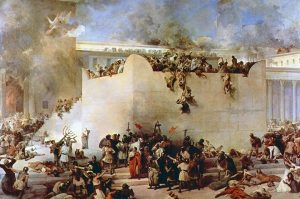We read much about ‘fake news’ these days and of efforts to rid the internet of it. But what of media that report dodgy stories derived from ‘insiders’ and ‘government sources’ and ‘contacts’? The great Roman historian Tacitus knew what to make of such sources.
The first Roman emperor Augustus died in AD 14. It was a critical moment. Who would succeed: Augustus’s grandson Postumus Agrippa, banished (by his wife Livia), or Tiberius, Livia’s son by her first marriage? Tacitus reported that Augustus and a companion, Fabius, arranged a reconciliation with Agrippa; that Fabius leaked and paid the price; and Livia at once recalled Tiberius from abroad, and then ‘saw to’ Augustus. The italicized words created the air of doubt and mystery: ‘Augustus’s health now deteriorated, and some suspected his wife Livia of foul play. For a rumor had got about that Augustus, confiding in a chosen few, had gone with a single companion, Fabius Maximus, to visit his grandson Postumus; that there were such tears and warmth all round that it seemed like a reconciliation; that Fabius had told his wife Marcia about it, and that she had told Livia; that Augustus learned of that leak and, shortly, Fabius was dead (perhaps by suicide); and that Marcia had been heard at the funeral lamenting and blaming herself for Fabius’s death. Whatever the facts of the matter, Livia immediately sent a letter, recalling Tiberius from abroad. When he reached Italy, it is not at all clear whether he found Augustus alive or dead. For Livia’s guards had sealed off the house and streets. Hopeful bulletins were posted, until the ‘necessary steps’ had been taken. A single report announced that Augustus was dead and Tiberius in control.’
Magnificent reportage, but what actually happened? Presumably not knowing, Tacitus used the story for serious historical purposes — to illustrate what life was like in the closed world of the imperial court, so unlike the free, open republic. But for the modern journalist, rumor and inside sources, however attractive, often generate only fake news. At least it sells papers.
This article is in The Spectator’s November 2019 US edition.


















